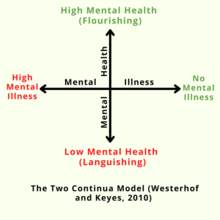
Happiness is a positive and pleasant emotion, ranging from contentment to intense joy. Moments of happiness may be triggered by positive life experiences or thoughts, but sometimes it may arise from no obvious cause. The level of happiness for longer periods of time is more strongly correlated with levels of life satisfaction, subjective well-being, flourishing and eudaimonia. In common usage, the word happy can be an appraisal of those measures themselves or as a shorthand for a "source" of happiness. As with any emotion, the precise definition of happiness has been a perennial debate in philosophy.
Positive psychology studies the conditions that contribute to the optimal functioning of people, groups, and institutions. It studies "positive subjective experience, positive individual traits, and positive institutions... it aims to improve quality of life."

Abraham Harold Maslow was an American psychologist who created Maslow's hierarchy of needs, a theory of psychological health predicated on fulfilling innate human needs in priority, culminating in self-actualization. Maslow was a psychology professor at Brandeis University, Brooklyn College, New School for Social Research, and Columbia University. He stressed the importance of focusing on the positive qualities in people, as opposed to treating them as a "bag of symptoms". A Review of General Psychology survey, published in 2002, ranked Maslow as the tenth most cited psychologist of the 20th century.
Clinical psychology is an integration of human science, behavioral science, theory, and clinical knowledge for the purpose of understanding, preventing, and relieving psychologically-based distress or dysfunction and to promote subjective well-being and personal development. Central to its practice are psychological assessment, clinical formulation, and psychotherapy, although clinical psychologists also engage in research, teaching, consultation, forensic testimony, and program development and administration. In many countries, clinical psychology is a regulated mental health profession.

Martin Elias Peter Seligman is an American psychologist, educator, and author of self-help books. Seligman is a strong promoter within the scientific community of his theories of well-being and positive psychology. His theory of learned helplessness is popular among scientific and clinical psychologists. A Review of General Psychology survey, published in 2002, ranked Seligman as the 31st most cited psychologist of the 20th century.
Darwinian Happiness: Evolution As a Guide for Living and Understanding Human Behavior, ISBN 0-87850-159-2, is a 2002 book by the Norwegian biologist Bjørn Grinde from the Norwegian Institute of Public Health. He argues that human emotions find their cause in evolution, and offers ways by which we can use this to our advantage.
Contentment is a state of being in which one is satisfied with their current life situation, and the state of affairs in one’s life as they presently are. If one is content, they are at inner peace with their situation and how the elements in one’s life are situated. Contrary to popular belief, it is possible to be content with one’s life regardless of the circumstance, regardless of whether things are going as one expected or not.

Jonathan David Haidt is an American social psychologist and author. He is the Thomas Cooley Professor of Ethical Leadership at the New York University Stern School of Business. His main areas of study are the psychology of morality and moral emotions.
Flourishing, or human flourishing, is the complete goodness of humans in a developmental life-span, that somehow includes positive psychological functioning and positive social functioning, along with other basic goods. The term has gained more usage and interest in recent times, but is rooted in ancient philosophical and theological usages. Aristotle’s term eudaimonia is one source for understanding human flourishing. The Hebrew Scriptures, or the Old Testament, also speak of flourishing, as they compare the just person to a growing tree. Christian Scriptures, or the New Testament, build upon Jewish usage and speak of flourishing as it can exist in heaven. The medieval theologian Thomas Aquinas drew from Aristotle as well as the Bible, and utilized the notion of flourishing in his philosophical theology. More recently, the Positive Psychology of Martin Seligman, Corey Keyes, Barbara Fredrickson, and others, have expanded and developed the notion of human flourishing. Empirical studies, such as those of the Harvard Human Flourishing Program, and practical applications, indicate the importance of the concept and the increasingly widespread use of the term in business, economics, and politics. In positive psychology, flourishing is "when people experience positive emotions, positive psychological functioning and positive social functioning, most of the time," living "within an optimal range of human functioning." It is a descriptor and measure of positive mental health and overall life well-being, and includes multiple components and concepts, such as cultivating strengths, subjective well-being, "goodness, generativity, growth, and resilience." In this view, flourishing is the opposite of both pathology and languishing, which are described as living a life that feels hollow and empty.
Edward Francis Diener was an American psychologist and author. Diener was a professor of psychology at the University of Utah and the University of Virginia, and Joseph R. Smiley Distinguished Professor Emeritus at the University of Illinois, as well as a senior scientist for the Gallup Organization. He is noted for his three decades of research on happiness, including work on temperament and personality influences on well-being, theories of well-being, income and well-being, cultural influences on well-being, and the measurement of well-being. As shown on Google Scholar as of April 2021, Diener's publications have been cited over 257,000 times.

Well-being, or wellbeing, also known as wellness, prudential value, prosperity or quality of life, is what is intrinsically valuable relative to someone. So the well-being of a person is what is ultimately good for this person, what is in the self-interest of this person. Well-being can refer to both positive and negative well-being. In its positive sense, it is sometimes contrasted with ill-being as its opposite. The term "subjective well-being" denotes how people experience and evaluate their lives, usually measured in relation to self-reported well-being obtained through questionnaires.
Despite a large body of positive psychological research into the relationship between happiness and productivity, happiness at work has traditionally been seen as a potential by-product of positive outcomes at work, rather than a pathway to business success. Happiness in the workplace is usually dependent on the work environment. During the past two decades, maintaining a level of happiness at work has become more significant and relevant due to the intensification of work caused by economic uncertainty and increase in competition. Nowadays, happiness is viewed by a growing number of scholars and senior executives as one of the major sources of positive outcomes in the workplace. In fact, companies with higher than average employee happiness exhibit better financial performance and customer satisfaction. It is thus beneficial for companies to create and maintain positive work environments and leadership that will contribute to the happiness of their employees.
Life satisfaction is an evaluation of a person's quality of life. It is assessed in terms of mood, relationship satisfaction, achieved goals, self-concepts, and self-perceived ability to cope with their life. Life satisfaction involves a favorable attitude towards one's life—rather than an assessment of current feelings. Life satisfaction has been measured in relation to economic standing, degree of education, experiences, residence, and other factors.
Positive psychology is defined as a method of building on what is good and what is already working instead of attempting to stimulate improvement by focusing on the weak links in an individual, a group, or in this case, a company. Implementing positive psychology in the workplace means creating an environment that is more enjoyable, productive, and values individual employees. This also means creating a work schedule that does not lead to emotional and physical distress.
The six-factor model of psychological well-being is a theory developed by Carol Ryff that determines six factors that contribute to an individual's psychological well-being, contentment, and happiness. Psychological well-being consists of self-acceptance, positive relationships with others, autonomy, environmental mastery, a feeling of purpose and meaning in life, and personal growth and development. Psychological well-being is attained by achieving a state of balance affected by both challenging and rewarding life events.
Savoring is the use of thoughts and actions to increase the intensity, duration, and appreciation of positive experiences and emotions. It is a topic commonly studied in the domain of positive psychology. It can also be referred to simply as the up-regulation of positive emotions. Traditional psychology attempts to develop methods of coping and dealing with negative emotions. Positive psychology uses the concept of savoring as a way to maximize the potential benefits that positive experiences and emotions can have on peoples' lives. The opposite of Savoring is known as dampening. Dampening is a method of dealing with positive affect by trying to feel worse, or down-regulate positive emotions.
Human Givens is the name of a theory in psychotherapy formulated in the United Kingdom, first outlined by Joe Griffin and Ivan Tyrrell in the late 1990s, and amplified in the 2003 book Human Givens: A new approach to emotional health and clear thinking. The human givens organising ideas proffer a description of the nature of human beings, the 'givens' of human genetic heritage and what humans need in order to be happy and healthy based on the research literature. Human Givens therapy draws on several psycho therapeutic models, such as motivational interviewing, cognitive behavioural therapy, psychoeducation, interpersonal therapy, imaginal exposure therapy and NLP such as the Rewind Technique, while seeking to use a client's strengths to enable them to get emotional needs met.

Nadine J. Kaslow is an American psychologist, the 2014 president of the American Psychological Association (APA) and the editor of the Journal of Family Psychology. Before her current affiliation with Emory University, Kaslow worked at Yale University. She was recipient of the 2004 American Psychological Association award for Distinguished Contributions to Education and Training in Psychology.
Well-being is a multifaceted topic studied in psychology, especially positive psychology. Biologically, well-being is highly influenced by endogenous molecules that impact happiness and euphoria in organisms, often referred to as "well-being related markers". Related concepts are eudaimonia, happiness, flourishing, quality of life, contentment, and meaningful life.
Lindsay G. Oades is an Australian wellbeing public policy strategist, author, researcher and academic. He is the Director of the Centre for Wellbeing Science and a professor at the University of Melbourne. He is also a non-executive Director of Action for Happiness Australia, and the Positive Education Schools Association. He is a former co-editor of the International Journal of Wellbeing.






